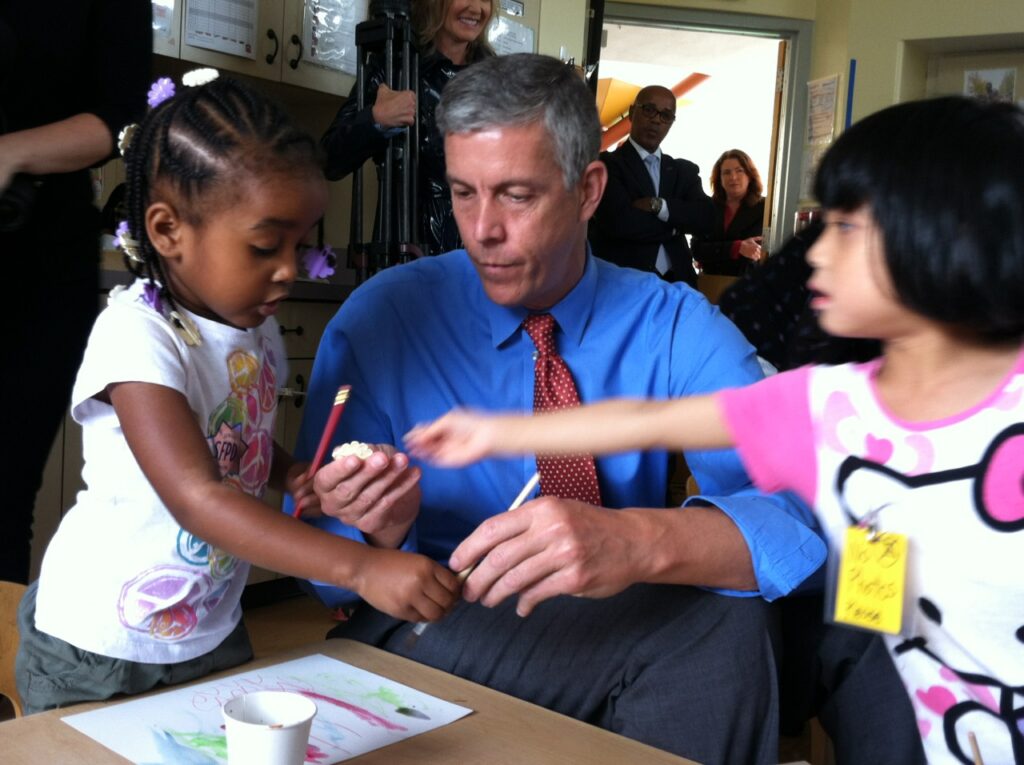President Obama’s call for universal preschool appears to have stalled in Washington due to political gridlock, but administration officials are hoping that states like California will pick up the slack.
U.S. Secretary of Education Arne Duncan said there aren’t any new executive or Congressional actions planned to advance the president’s proposal for universal preschool for 4-year-olds. Federal efforts have turned to partnering with states, where he says he is seeing considerable progress.
Duncan called universal preschool “an idea whose time has come.”
“As a nation, this has to become a priority,” he said.
“We push as hard as we can,” said Duncan, who was at a town hall event Monday in San Francisco to tout the city and the state’s efforts in early childhood education. “Governors across the nation are partnering with us because this is the best investment as a society. It’s a coalition of the willing. Far too many kids still don’t have access to preschool, which makes no sense whatsoever.”
Duncan praised California’s efforts, even though a big push for expanding the state’s transitional kindergarten program to all 4-year-olds fell short in the state Legislature. Instead, Gov. Jerry Brown signed a budget that included nearly $273 million for early learning and child development, which was the biggest investment in early education in over a decade, according to Early Edge California, an advocacy group promoting universal preschool. The funds made it possible for the state to offer 7,500 full-day, full-year preschool slots this year and an additional 4,000 next year. The budget bill pledges to add an additional 31,500 slots in upcoming years. The plan will eventually cover half of California’s 4-year-olds.
Earlier in the day, Duncan toured the Yerba Buena Gardens Child Development Center, a San Francisco preschool, and interacted with the students, who wrote letters to President Obama during class.
State Sen. Darrell Steinberg, D-Sacramento, had proposed making one year of voluntary transitional kindergarten available to all 4-year-olds in California. But he was met with resistance from Brown and other legislators because of the $2.5 billion cost, he said.
Still, “we planted a big seed,” said Steinberg, who spoke at the event. “We have made a big stride, a huge stride, but the work is never done.”
Steinberg and other early childhood education advocates say investing in preschool has long-term benefits, such as cutting future incarceration rates.
In San Francisco, which passed its own tax in March of 2004 to fund preschool for low-income 4-year-olds, San Francisco Unified Superintendent Richard Carranza said access to high quality pre-kindergarten education leads to higher attendance rates in the district. Students in such programs are better prepared for school when they enter the K-12 system, he said.
Carranza sees universal preschool as “a social justice issue.”
“We would never let a kid go unfed,” he said. “How can we let a kid go intellectually unfed.”
The Obama administration has taken note of California’s efforts to expand access to early childhood education.
“We came to California to celebrate,” said Libby Doggett, deputy assistant secretary for Policy and Early Learning in the U.S. Department of Education. She said California needs to be a role model for other states. While Congress has yet to act, she said the November elections might open up new possibilities. “With a new Congress, there is always a new chance,” she said. “We’ve got to have the federal government step up.”
California and other states recently applied for federal preschool development grants to help expand public preschool programs.
“You will be very competitive, I am sure,” Doggett said.
To get more reports like this one, click here to sign up for EdSource’s no-cost daily email on latest developments in education.
